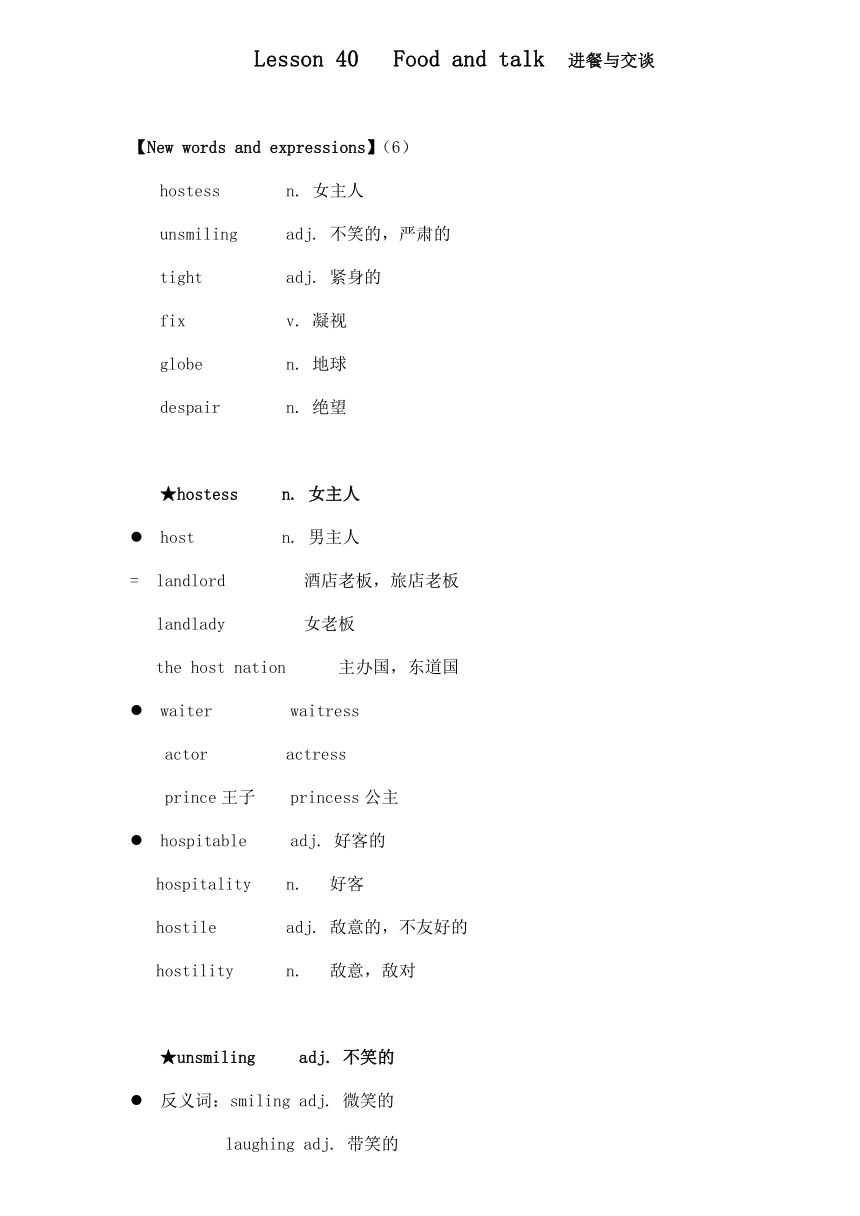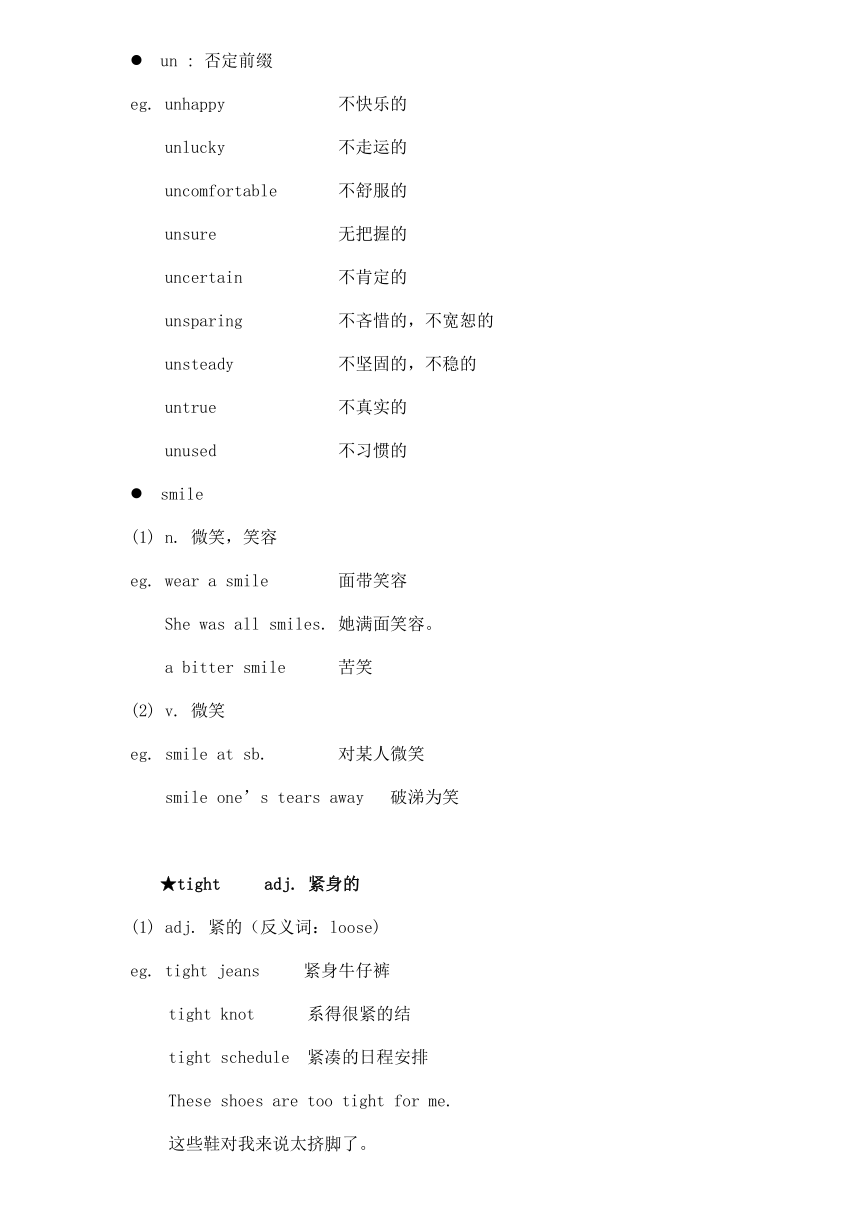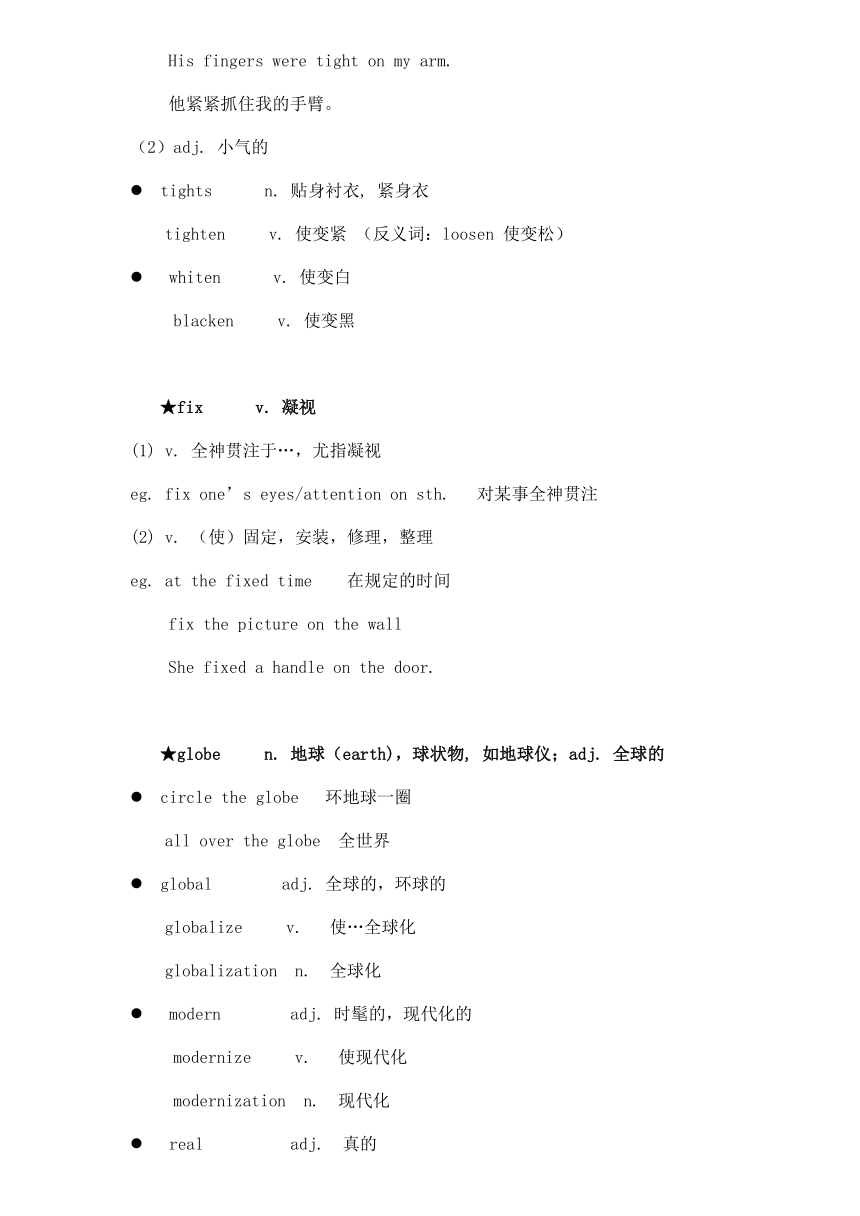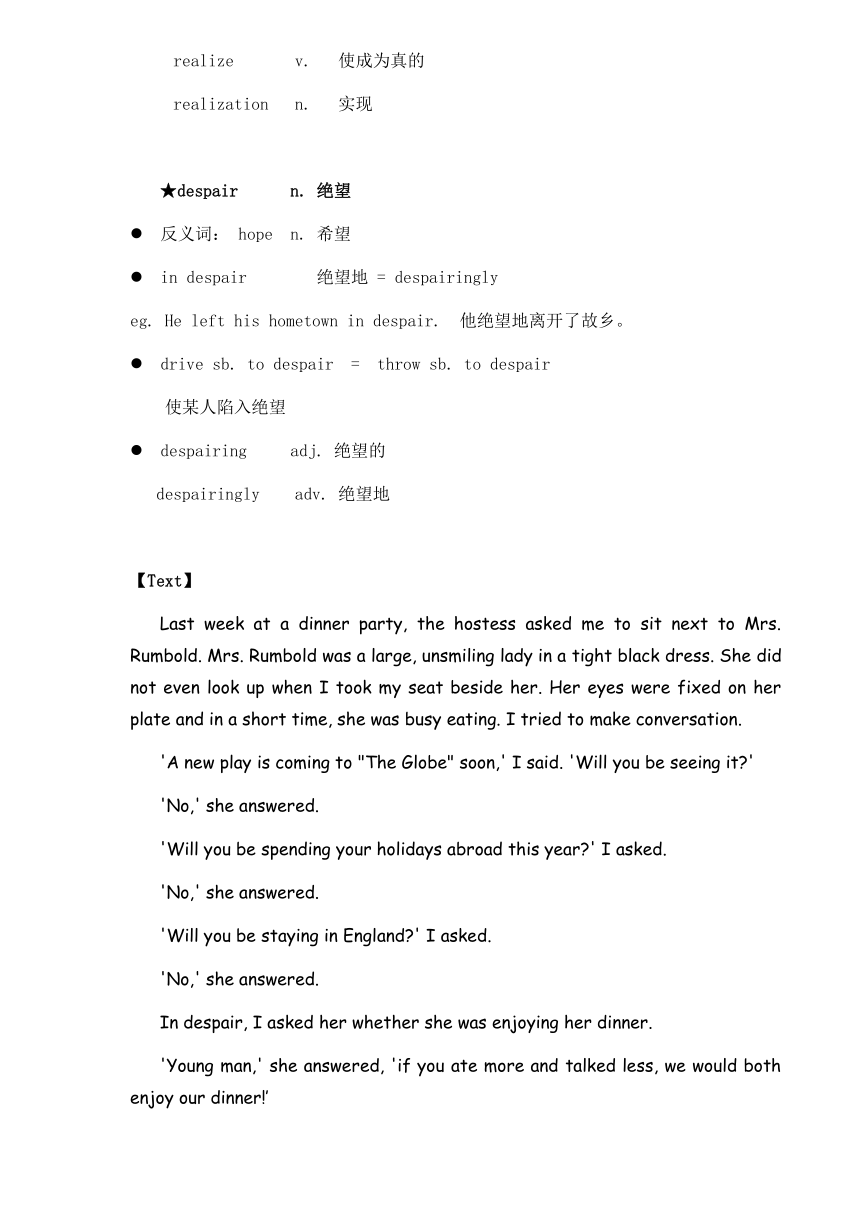新概念英语二册超详教案讲义笔记Lesson 40 Food and talk 进餐与交谈
文档属性
| 名称 | 新概念英语二册超详教案讲义笔记Lesson 40 Food and talk 进餐与交谈 |  | |
| 格式 | docx | ||
| 文件大小 | 25.9KB | ||
| 资源类型 | 教案 | ||
| 版本资源 | 新概念英语 | ||
| 科目 | 英语 | ||
| 更新时间 | 2023-09-26 06:56:57 | ||
图片预览




文档简介
Lesson 40 Food and talk 进餐与交谈
【New words and expressions】(6)
hostess n. 女主人
unsmiling adj. 不笑的,严肃的
tight adj. 紧身的
fix v. 凝视
globe n. 地球
despair n. 绝望
★hostess n. 女主人
host n. 男主人
= landlord 酒店老板,旅店老板
landlady 女老板
the host nation 主办国,东道国
waiter waitress
actor actress
prince王子 princess公主
hospitable adj. 好客的
hospitality n. 好客
hostile adj. 敌意的,不友好的
hostility n. 敌意,敌对
★unsmiling adj. 不笑的
反义词:smiling adj. 微笑的
laughing adj. 带笑的
un : 否定前缀
eg. unhappy 不快乐的
unlucky 不走运的
uncomfortable 不舒服的
unsure 无把握的
uncertain 不肯定的
unsparing 不吝惜的,不宽恕的
unsteady 不坚固的,不稳的
untrue 不真实的
unused 不习惯的
smile
n. 微笑,笑容
eg. wear a smile 面带笑容
She was all smiles. 她满面笑容。
a bitter smile 苦笑
v. 微笑
eg. smile at sb. 对某人微笑
smile one’s tears away 破涕为笑
★tight adj. 紧身的
adj. 紧的(反义词:loose)
eg. tight jeans 紧身牛仔裤
tight knot 系得很紧的结
tight schedule 紧凑的日程安排
These shoes are too tight for me.
这些鞋对我来说太挤脚了。
His fingers were tight on my arm.
他紧紧抓住我的手臂。
(2)adj. 小气的
tights n. 贴身衬衣, 紧身衣
tighten v. 使变紧 (反义词:loosen 使变松)
whiten v. 使变白
blacken v. 使变黑
★fix v. 凝视
v. 全神贯注于…,尤指凝视
eg. fix one’s eyes/attention on sth. 对某事全神贯注
(2) v. (使)固定,安装,修理,整理
eg. at the fixed time 在规定的时间
fix the picture on the wall
She fixed a handle on the door.
★globe n. 地球(earth),球状物, 如地球仪;adj. 全球的
circle the globe 环地球一圈
all over the globe 全世界
global adj. 全球的,环球的
globalize v. 使…全球化
globalization n. 全球化
modern adj. 时髦的,现代化的
modernize v. 使现代化
modernization n. 现代化
real adj. 真的
realize v. 使成为真的
realization n. 实现
★despair n. 绝望
反义词: hope n. 希望
in despair 绝望地 = despairingly
eg. He left his hometown in despair. 他绝望地离开了故乡。
drive sb. to despair = throw sb. to despair
使某人陷入绝望
despairing adj. 绝望的
despairingly adv. 绝望地
【Text】
Last week at a dinner party, the hostess asked me to sit next to Mrs. Rumbold. Mrs. Rumbold was a large, unsmiling lady in a tight black dress. She did not even look up when I took my seat beside her. Her eyes were fixed on her plate and in a short time, she was busy eating. I tried to make conversation.
'A new play is coming to "The Globe" soon,' I said. 'Will you be seeing it '
'No,' she answered.
'Will you be spending your holidays abroad this year ' I asked.
'No,' she answered.
'Will you be staying in England ' I asked.
'No,' she answered.
In despair, I asked her whether she was enjoying her dinner.
'Young man,' she answered, 'if you ate more and talked less, we would both enjoy our dinner!’
参考译文
在上星期的一次宴会上, 女主人安排我坐在兰伯尔德夫人的身旁. 兰伯尔德夫人是一位身材高大、表情严肃的女人, 穿一件紧身的黑衣服. 当我在她身旁坐下来的时候, 她甚至连头都没有抬一下. 她的眼睛盯着自己的盘子, 不一会儿就忙着吃起来了. 我试图找个话题和她聊聊.
“一出新剧要来‘环球剧场’上演了, “我说, “您去看吗 ”
“不, “她回答. “您今年去国外度假吗 ” 我又问.
“不, “她回答.
“您就呆在英国吗 ” 我问.
“不, “她回答.
失望之中我问她饭是否吃得满意.
“年轻人, “她回答说, “如果你多吃点, 少说点, 我们两个都会吃得好的!”
【课文讲解】
1、Last week at a dinner party, the hostess asked me to sit next to Mrs. Rumbold.
at a dinner party 在宴会上面
(dinner为不可数名词,“at a dinner party”中的“a”并不修饰“dinner”而是 “party”,have dinner不加“a” )
ask sb. to do sth. 叫某人做某事
next to
(场所,价值,顺序等)最接近的,在…旁边的,紧接着…的
eg. At the dinner party, I sat next to a large lady.
宴会上,我坐在一个身材高大的女士旁边。
在…后面,跟在…之后
eg. I am next to nobody in the test. 考试中我不落后于任何人。
I came next to last in the exam. 我考试得了倒数第二名。
2、Mrs. Rumbold was a large, unsmiling lady in a tight black dress.
in a tight black dress 穿着紧身的黑色衣服
in prep. 穿戴(衣物等)
eg. the man in the hat 戴着帽子的男子
3、She did not even look up when I took my seat beside her.
even
(1) adv.甚至,连(通常置于所修饰的词前面,若修饰动词,则应放在助动词后,实意动词前)
eg. Even a child can answer such an easy question.
He wants me to work even late at night.
就连深夜他也要我工作。
(2) even修饰比较级 = still
eg. This book is interesting, but that one is even more interesting.
look up
查看,查词典
抬头看,向上看
take a seat 坐下,比sit要正式
= have a seat
eg. Please take a seat. 请坐
take one’s seat 表示位置事先已安排好
eg. After everyone had taken his seat, the meeting/dinner/party began.
seat
v. 坐下
eg. Please be seated. = Sit down please.
seat oneself
eg. He seated himself next to her. 他坐在她旁边。
4、Her eyes were fixed on her plate and in a short time, she was busy eating.
be busy at sth. = be busy with sth. 忙于某事
be busy (in) doing sth. 忙着做某事
eg. She is busy at her homework.
She is busy at her wedding.
She is busy writing letters.
as busy as a bee 忙个不停
busybody 爱管闲事的人
I tried to make conversation.
make conversation 闲谈,聊天
informal conversation 不拘礼节地交谈(不正式的交谈)
talk 谈话(比较严肃)
talk with/to sb. 和某人谈话
make的用法小结:(make被称为万能词)
make the bed 铺床
make noise 制造噪音
make a promise 保证
make trouble 捣蛋,制造麻烦
make progress 取得进步
make money 挣钱
make a speech 做演讲
make a mistake 犯错
make up one's mind 下定决心,拿定主意
do的用法小结:(do 被称为万能词)
do one's best 尽最大努力
do one's homework 做作业
do sb. a favour 帮忙
do a job 做家务
do work 干活
do exercise 做练习
do business 做生意
do some shopping 买东西,购物
do swimming 游泳
do some reading 读书
do with 处理
do the dishes 洗碗
6、'A new play is coming to "The Globe" soon,' I said. 'Will you be seeing it '
is coming 现在进行时态表示将来的意思
Will you be seeing it
will be doing 用将来进行时询问别人的计划、打算,比一般将来时更显礼貌。
‘No,’ she answered. ‘Will you be spending your holidays abroad this year ’ I asked. ‘No,’ she answered. ‘Will you be staying in England ’ I asked. ‘No,’ she answered. In despair, I asked her whether she was enjoying her dinner.
I asked her whether she was enjoying her dinner.
原句应为:Are you enjoying your dinner
8、'Young man,' she answered, 'if you ate more and talked less, we would both enjoy our dinner!’
if you ate more and talked less, we would both enjoy our dinner.
if 引导的条件句,表达一种非真实性假设。
ate more and talked less (结构非常简洁,形成鲜明对比)
在并列句中,相同的句子成分(如主语、谓语、状语等)通常由同一词性的单词/词组表示,并且它们的长度也差不多,以保持句子的平衡性。
You can either go out or stay here.
He wants to buy a lot of things, but he has little money.
他想买的东西很多,但他的钱很少。
【Key structures】
第2类条件句(虚拟条件句)
if引导的条件句
真实条件句:
对将来可能发生的事情的假设,主句中用将来时或祈使句,从句用现在时。
eg. If he is out, I’ll call tomorrow.
You’ll miss the train if you don’t hurry.
非真实条件句(虚拟语气):
if从句谈论想象的情况,主句则推测想象的结果,在从句中要用动词的过去时,主句是would do, 如果if从句的动词是be, 那么无论从句主语是第几人称,统统用were的形式。
eg. If you went to the exhibition you would enjoy it.
If you saw him now you wouldn’t recognize him.
If I were in your position, I would act differently.
【New words and expressions】(6)
hostess n. 女主人
unsmiling adj. 不笑的,严肃的
tight adj. 紧身的
fix v. 凝视
globe n. 地球
despair n. 绝望
★hostess n. 女主人
host n. 男主人
= landlord 酒店老板,旅店老板
landlady 女老板
the host nation 主办国,东道国
waiter waitress
actor actress
prince王子 princess公主
hospitable adj. 好客的
hospitality n. 好客
hostile adj. 敌意的,不友好的
hostility n. 敌意,敌对
★unsmiling adj. 不笑的
反义词:smiling adj. 微笑的
laughing adj. 带笑的
un : 否定前缀
eg. unhappy 不快乐的
unlucky 不走运的
uncomfortable 不舒服的
unsure 无把握的
uncertain 不肯定的
unsparing 不吝惜的,不宽恕的
unsteady 不坚固的,不稳的
untrue 不真实的
unused 不习惯的
smile
n. 微笑,笑容
eg. wear a smile 面带笑容
She was all smiles. 她满面笑容。
a bitter smile 苦笑
v. 微笑
eg. smile at sb. 对某人微笑
smile one’s tears away 破涕为笑
★tight adj. 紧身的
adj. 紧的(反义词:loose)
eg. tight jeans 紧身牛仔裤
tight knot 系得很紧的结
tight schedule 紧凑的日程安排
These shoes are too tight for me.
这些鞋对我来说太挤脚了。
His fingers were tight on my arm.
他紧紧抓住我的手臂。
(2)adj. 小气的
tights n. 贴身衬衣, 紧身衣
tighten v. 使变紧 (反义词:loosen 使变松)
whiten v. 使变白
blacken v. 使变黑
★fix v. 凝视
v. 全神贯注于…,尤指凝视
eg. fix one’s eyes/attention on sth. 对某事全神贯注
(2) v. (使)固定,安装,修理,整理
eg. at the fixed time 在规定的时间
fix the picture on the wall
She fixed a handle on the door.
★globe n. 地球(earth),球状物, 如地球仪;adj. 全球的
circle the globe 环地球一圈
all over the globe 全世界
global adj. 全球的,环球的
globalize v. 使…全球化
globalization n. 全球化
modern adj. 时髦的,现代化的
modernize v. 使现代化
modernization n. 现代化
real adj. 真的
realize v. 使成为真的
realization n. 实现
★despair n. 绝望
反义词: hope n. 希望
in despair 绝望地 = despairingly
eg. He left his hometown in despair. 他绝望地离开了故乡。
drive sb. to despair = throw sb. to despair
使某人陷入绝望
despairing adj. 绝望的
despairingly adv. 绝望地
【Text】
Last week at a dinner party, the hostess asked me to sit next to Mrs. Rumbold. Mrs. Rumbold was a large, unsmiling lady in a tight black dress. She did not even look up when I took my seat beside her. Her eyes were fixed on her plate and in a short time, she was busy eating. I tried to make conversation.
'A new play is coming to "The Globe" soon,' I said. 'Will you be seeing it '
'No,' she answered.
'Will you be spending your holidays abroad this year ' I asked.
'No,' she answered.
'Will you be staying in England ' I asked.
'No,' she answered.
In despair, I asked her whether she was enjoying her dinner.
'Young man,' she answered, 'if you ate more and talked less, we would both enjoy our dinner!’
参考译文
在上星期的一次宴会上, 女主人安排我坐在兰伯尔德夫人的身旁. 兰伯尔德夫人是一位身材高大、表情严肃的女人, 穿一件紧身的黑衣服. 当我在她身旁坐下来的时候, 她甚至连头都没有抬一下. 她的眼睛盯着自己的盘子, 不一会儿就忙着吃起来了. 我试图找个话题和她聊聊.
“一出新剧要来‘环球剧场’上演了, “我说, “您去看吗 ”
“不, “她回答. “您今年去国外度假吗 ” 我又问.
“不, “她回答.
“您就呆在英国吗 ” 我问.
“不, “她回答.
失望之中我问她饭是否吃得满意.
“年轻人, “她回答说, “如果你多吃点, 少说点, 我们两个都会吃得好的!”
【课文讲解】
1、Last week at a dinner party, the hostess asked me to sit next to Mrs. Rumbold.
at a dinner party 在宴会上面
(dinner为不可数名词,“at a dinner party”中的“a”并不修饰“dinner”而是 “party”,have dinner不加“a” )
ask sb. to do sth. 叫某人做某事
next to
(场所,价值,顺序等)最接近的,在…旁边的,紧接着…的
eg. At the dinner party, I sat next to a large lady.
宴会上,我坐在一个身材高大的女士旁边。
在…后面,跟在…之后
eg. I am next to nobody in the test. 考试中我不落后于任何人。
I came next to last in the exam. 我考试得了倒数第二名。
2、Mrs. Rumbold was a large, unsmiling lady in a tight black dress.
in a tight black dress 穿着紧身的黑色衣服
in prep. 穿戴(衣物等)
eg. the man in the hat 戴着帽子的男子
3、She did not even look up when I took my seat beside her.
even
(1) adv.甚至,连(通常置于所修饰的词前面,若修饰动词,则应放在助动词后,实意动词前)
eg. Even a child can answer such an easy question.
He wants me to work even late at night.
就连深夜他也要我工作。
(2) even修饰比较级 = still
eg. This book is interesting, but that one is even more interesting.
look up
查看,查词典
抬头看,向上看
take a seat 坐下,比sit要正式
= have a seat
eg. Please take a seat. 请坐
take one’s seat 表示位置事先已安排好
eg. After everyone had taken his seat, the meeting/dinner/party began.
seat
v. 坐下
eg. Please be seated. = Sit down please.
seat oneself
eg. He seated himself next to her. 他坐在她旁边。
4、Her eyes were fixed on her plate and in a short time, she was busy eating.
be busy at sth. = be busy with sth. 忙于某事
be busy (in) doing sth. 忙着做某事
eg. She is busy at her homework.
She is busy at her wedding.
She is busy writing letters.
as busy as a bee 忙个不停
busybody 爱管闲事的人
I tried to make conversation.
make conversation 闲谈,聊天
informal conversation 不拘礼节地交谈(不正式的交谈)
talk 谈话(比较严肃)
talk with/to sb. 和某人谈话
make的用法小结:(make被称为万能词)
make the bed 铺床
make noise 制造噪音
make a promise 保证
make trouble 捣蛋,制造麻烦
make progress 取得进步
make money 挣钱
make a speech 做演讲
make a mistake 犯错
make up one's mind 下定决心,拿定主意
do的用法小结:(do 被称为万能词)
do one's best 尽最大努力
do one's homework 做作业
do sb. a favour 帮忙
do a job 做家务
do work 干活
do exercise 做练习
do business 做生意
do some shopping 买东西,购物
do swimming 游泳
do some reading 读书
do with 处理
do the dishes 洗碗
6、'A new play is coming to "The Globe" soon,' I said. 'Will you be seeing it '
is coming 现在进行时态表示将来的意思
Will you be seeing it
will be doing 用将来进行时询问别人的计划、打算,比一般将来时更显礼貌。
‘No,’ she answered. ‘Will you be spending your holidays abroad this year ’ I asked. ‘No,’ she answered. ‘Will you be staying in England ’ I asked. ‘No,’ she answered. In despair, I asked her whether she was enjoying her dinner.
I asked her whether she was enjoying her dinner.
原句应为:Are you enjoying your dinner
8、'Young man,' she answered, 'if you ate more and talked less, we would both enjoy our dinner!’
if you ate more and talked less, we would both enjoy our dinner.
if 引导的条件句,表达一种非真实性假设。
ate more and talked less (结构非常简洁,形成鲜明对比)
在并列句中,相同的句子成分(如主语、谓语、状语等)通常由同一词性的单词/词组表示,并且它们的长度也差不多,以保持句子的平衡性。
You can either go out or stay here.
He wants to buy a lot of things, but he has little money.
他想买的东西很多,但他的钱很少。
【Key structures】
第2类条件句(虚拟条件句)
if引导的条件句
真实条件句:
对将来可能发生的事情的假设,主句中用将来时或祈使句,从句用现在时。
eg. If he is out, I’ll call tomorrow.
You’ll miss the train if you don’t hurry.
非真实条件句(虚拟语气):
if从句谈论想象的情况,主句则推测想象的结果,在从句中要用动词的过去时,主句是would do, 如果if从句的动词是be, 那么无论从句主语是第几人称,统统用were的形式。
eg. If you went to the exhibition you would enjoy it.
If you saw him now you wouldn’t recognize him.
If I were in your position, I would act differently.
同课章节目录
